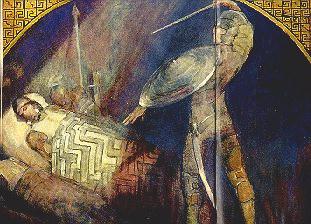
(not her actual title for the painting)
Wikimedia Commons
At this point in my manuscript, having just briefly treated the origins of chess and chess terminology in the Middle East, I offer a brief aside:
The idea behind the notion of “checkmate” is worth pursuing. Players of chess will remember that nothing else really matters in the game except neutralizing your opponent’s king. Even if the other player still has his queen and all his other pieces, he loses the game if his king is taken out. This was a very common idea in antiquity; chess merely reflects premodern military thinking. A clear historical illustration can be found in a book called the Anabasis, a classic piece of autobiography written by the ancient Greek writer Xenophon. Xenophon was part of a force of Greek mercenary soldiers who set out for Persia to help put a particular member of that nation’s royal family on the throne in place of his brother. When the battle began, things were going well until their leader, inflamed by the victory that was soon to be his, went too far ahead of his bodyguards and was killed. Immediately, although poised on the brink of triumph, his armies melted away and fled. The war was over. The “king” was dead. Checkmate.
Why do I find this of particular interest? Because a similar idea seems to occur in the Book of Mormon. When Teancum managed, at great personal risk, to sneak into the tent of Amalickiah on New Year’s Eve and drive a javelin through that evil man’s heart, “the Lamanites… were affrighted; and they abandoned their design in marching into the land northward, and retreated with all their army into the city of Mulek, and sought protection in their fortifications.”[1] Later, Teancum died in a successful attempt to do the same thing to Ammoron, Amalickiah’s equally wicked brother and successor.[2] Why would Teancum be willing to undergo so great a risk merely to get the king? Because when the king is dead, the game is effectively over. That this authentically ancient idea pervades the Book of Mormon is shown by the way the book uses the term destroy. The Jaredites were utterly “destroyed,” and yet it is clear that many survived. What is actually meant is that their leadership was eliminated, not necessarily that every last man, woman, and child of them was killed.[3] Thus, as in so many ways, the Book of Mormon seems to reveal its connections with the Near East. (Chess as evidence of the gospel!)
[1] See Alma 51:33-52:2.
[2] Alma 62:35-39.
[3] For good discussions of this matter as it relates to the Book of Mormon, see Hugh Nibley, Lehi in the Desert/The World of the Jaredites/There Were Jaredites, Volume 5 in the Collected Works of Hugh Nibley, edited by John W. Welch, et al. (Salt Lake City and Provo: Deseret Book and the Foundation for Ancient Research and Mormon Studies, 1988), 237-54; John L. Sorenson, An Ancient American Setting for the Book of Mormon (Salt Lake City and Provo: Deseret Book and the Foundation for Ancient Research and Mormon Studies, 1985), 119-20.
***
Thanks to Matthew Wheeler for calling this item to my attention:












